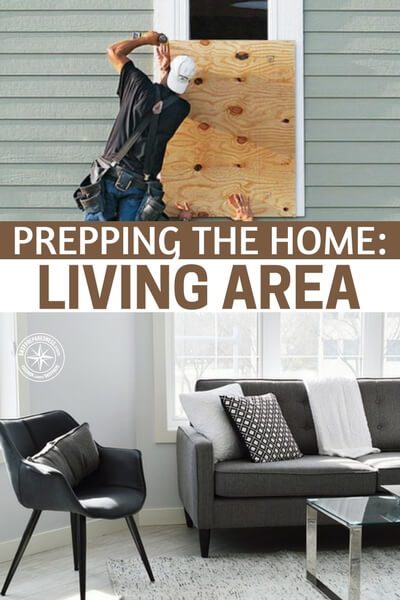SHTFPreparedness may collect a share of sales or other compensation from the links on this page.
A family’s living room is a sanctuary for bonding, the place where memories are made. In the event of a natural disaster, you want to do everything you can to protect your entire home, but let’s focus on prepping the main living area.

Here are a few tips and strategies on how to prep your living room. You could even look at setting up an alternative or “safe” space in the basement if you have one.
Secure Large Furniture
In the event of an emergency such as a hurricane, earthquake, or tornado, make sure all of the large pieces on the wall are securely fastened. This includes mirrors, large picture frames, shelves, clocks, and pieces of art, to name a few.
As for large furniture on the floor, such as entertainment centers and bookshelves, you could bolt them to the walls to prevent them from rolling around or falling over. Move or store large, heavy, and breakable items to the lower shelves.
You can strap or bolt the television to the media console, too. Some people even choose to buy earthquake-proof furniture that is designed to withstand a ceiling collapsing, for example.
As a safety precaution during an earthquake, you should drop to the ground and move into a door frame. Stay away from windows, ceiling fans, lighting fixtures, etc.
Board the Windows
If you live in Tornado Alley or hurricane country and a storm is coming, consider boarding your windows to protect your house from potential damage. If you don’t have storm shutters, it’s wise to pre-cut sheets of plywood in the event of a natural disaster.
There are about 60 tornado fatalities a year, most of which occur because of flying or falling debris. If you don’t have a basement in which to seek shelter, use thick padding or a mattress to cover yourself.
Stay away from windows and move to the lowest place in the house or in an apartment building, and go to a windowless room or hallway in the center of the house or under a stairwell. Cover the back of your head with your hands.
Proper Ventilation
In the case of a power outage, unplug appliances and electronics and turn off the air conditioning or heat, whether you stay in the house or evacuate. This will prevent damage when the electricity surges back on. Leave one lamp on so you’ll know when the power is back.
Your heating, ventilation and air conditioning (HVAC) system keeps you warm in the winter and cool in the summer, so you want to make sure your HVAC system is working properly year-round in case of an emergency. HVAC systems are essential, and they aren’t cheap.
Flooding especially can destroy HVAC equipment, depending on how long the system is underwater. You could hire a contractor to build a flood-proof wall around your current set up or move the equipment to an upper-level floor.
Severe weather can cause a lot of destruction, damage, injuries, and even deaths, so you want to prepare yourselves and your homes in the event of an emergency.
The past few years have been especially extreme and deadly in the aftermath of hurricanes and fires. Advanced warning systems are vital to alerting people of impending natural disasters so that we can be prepared to weather a storm.
